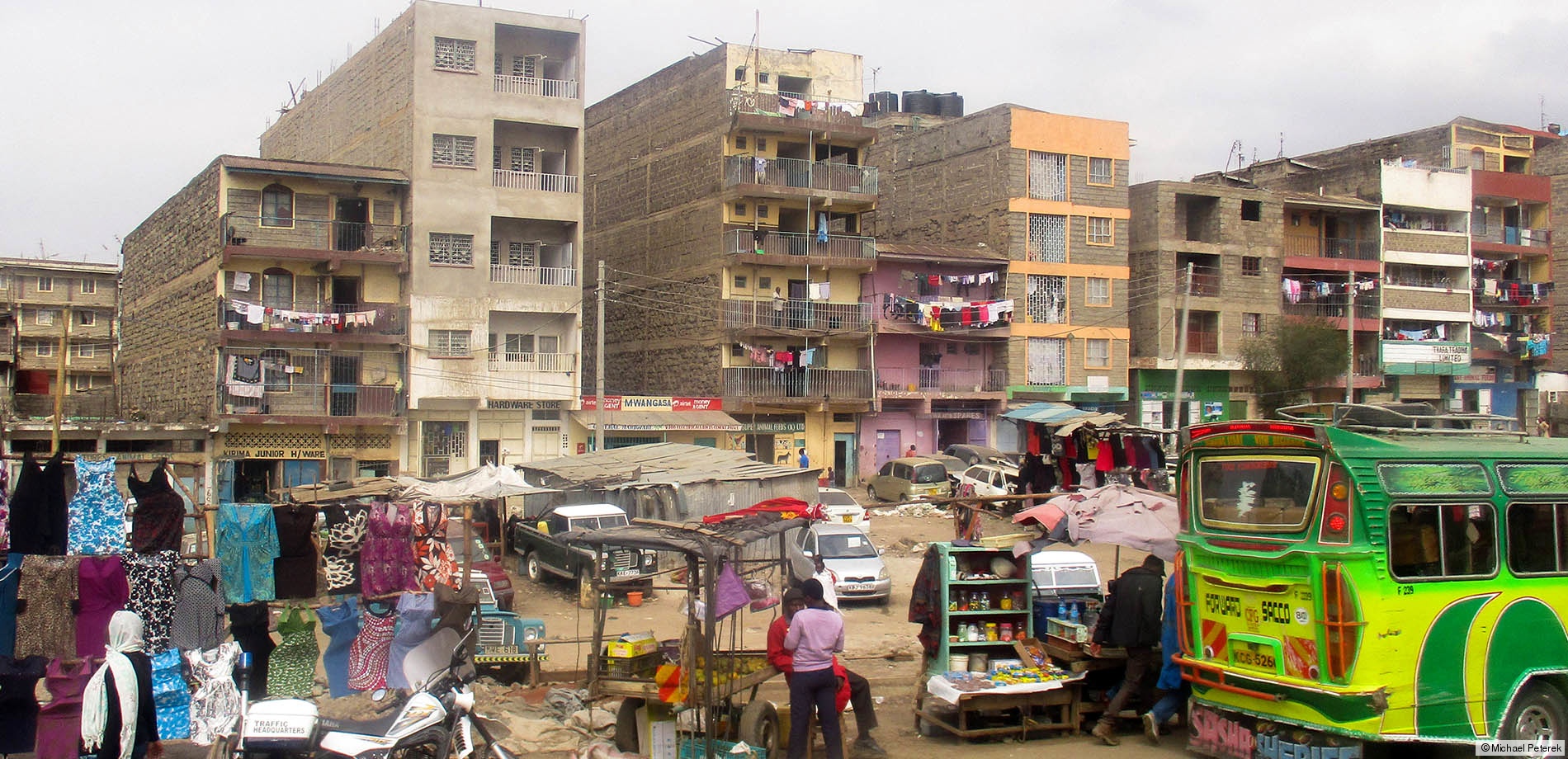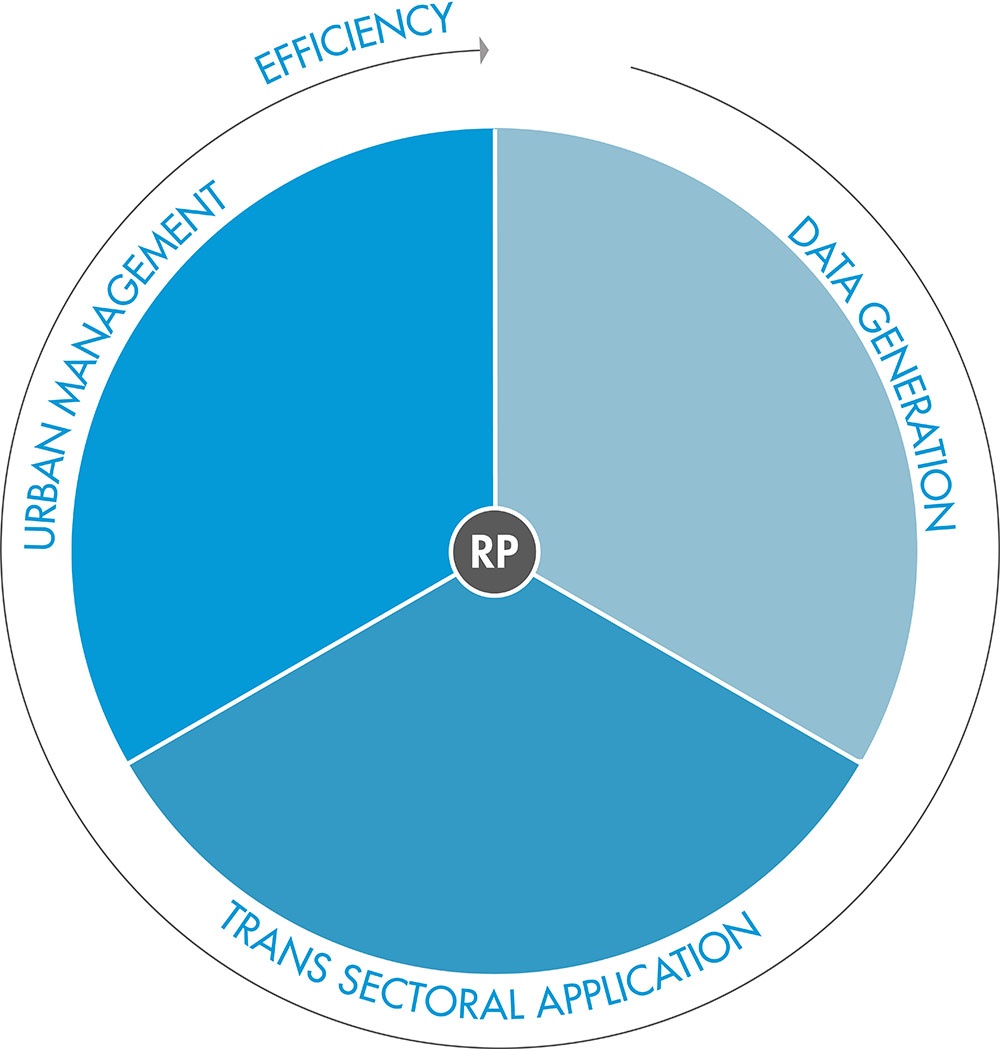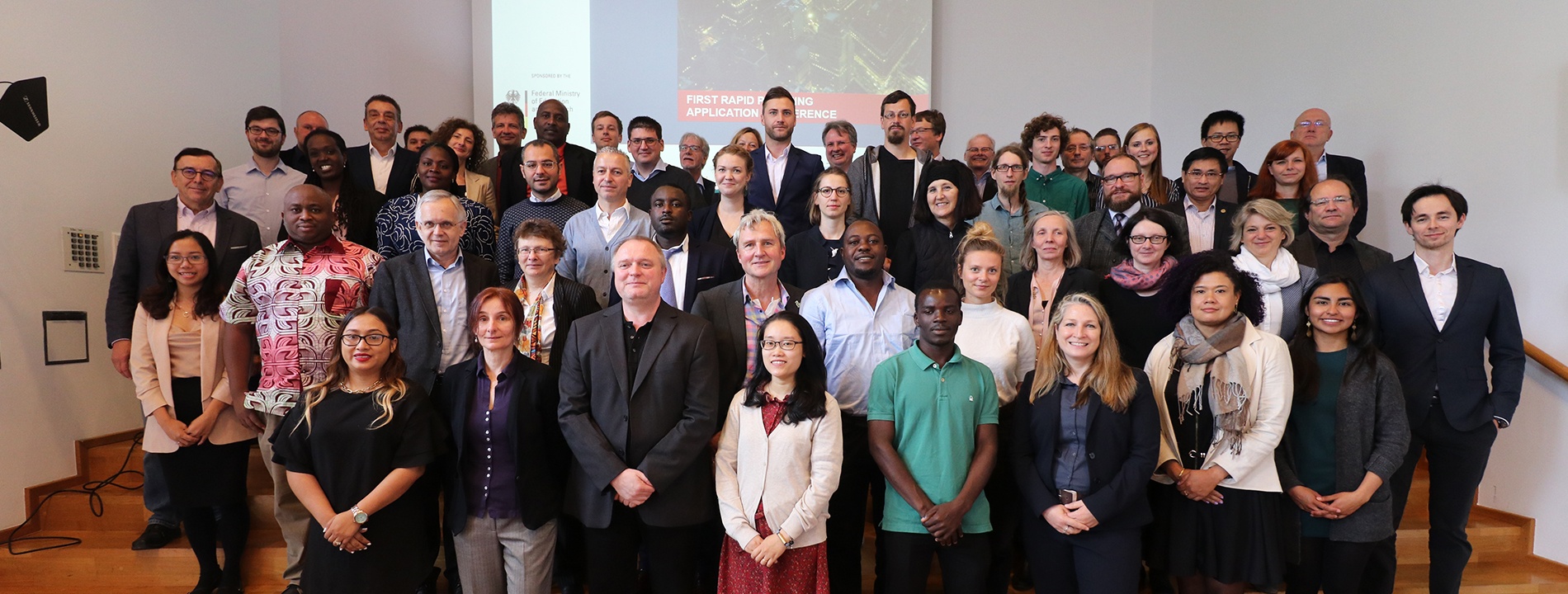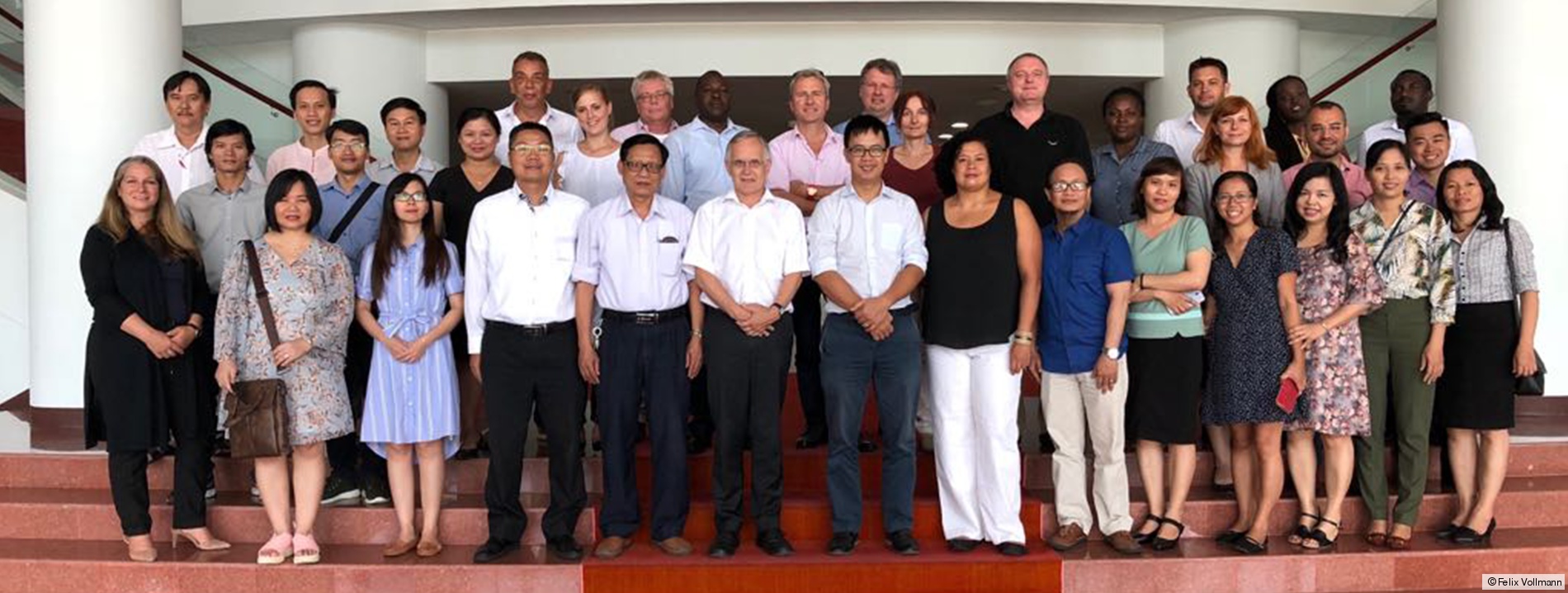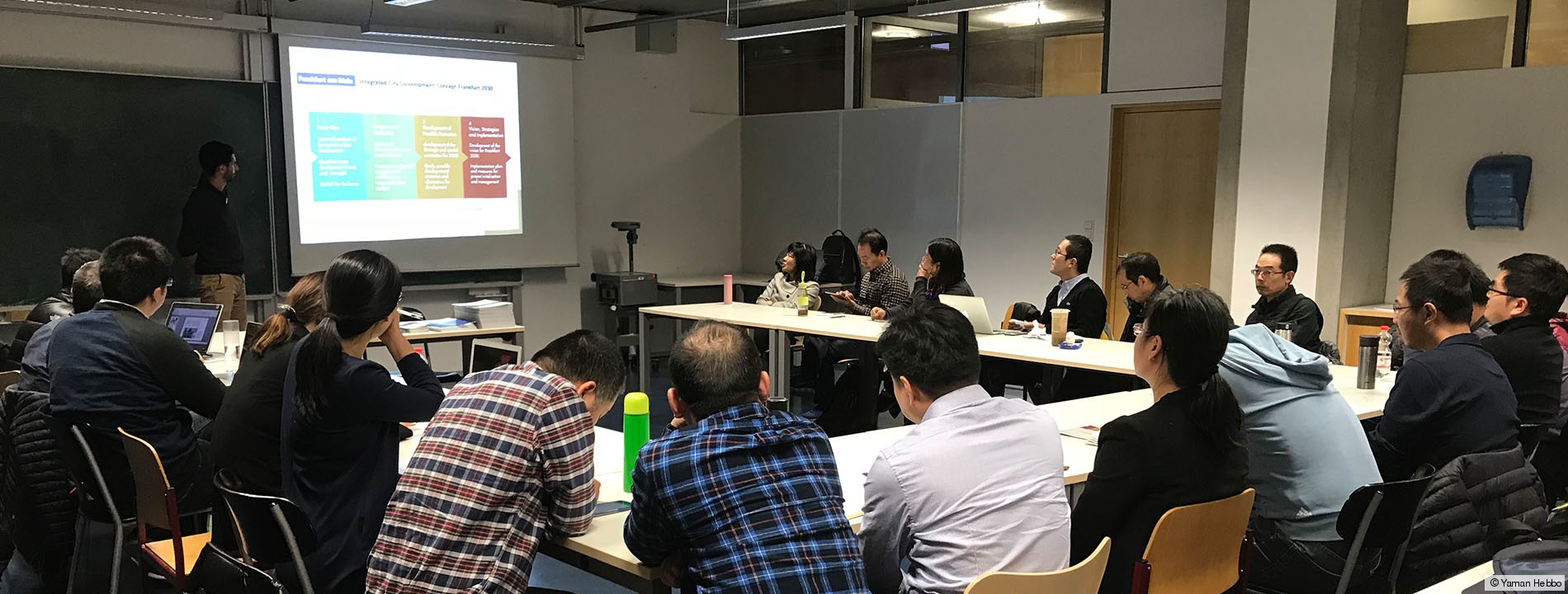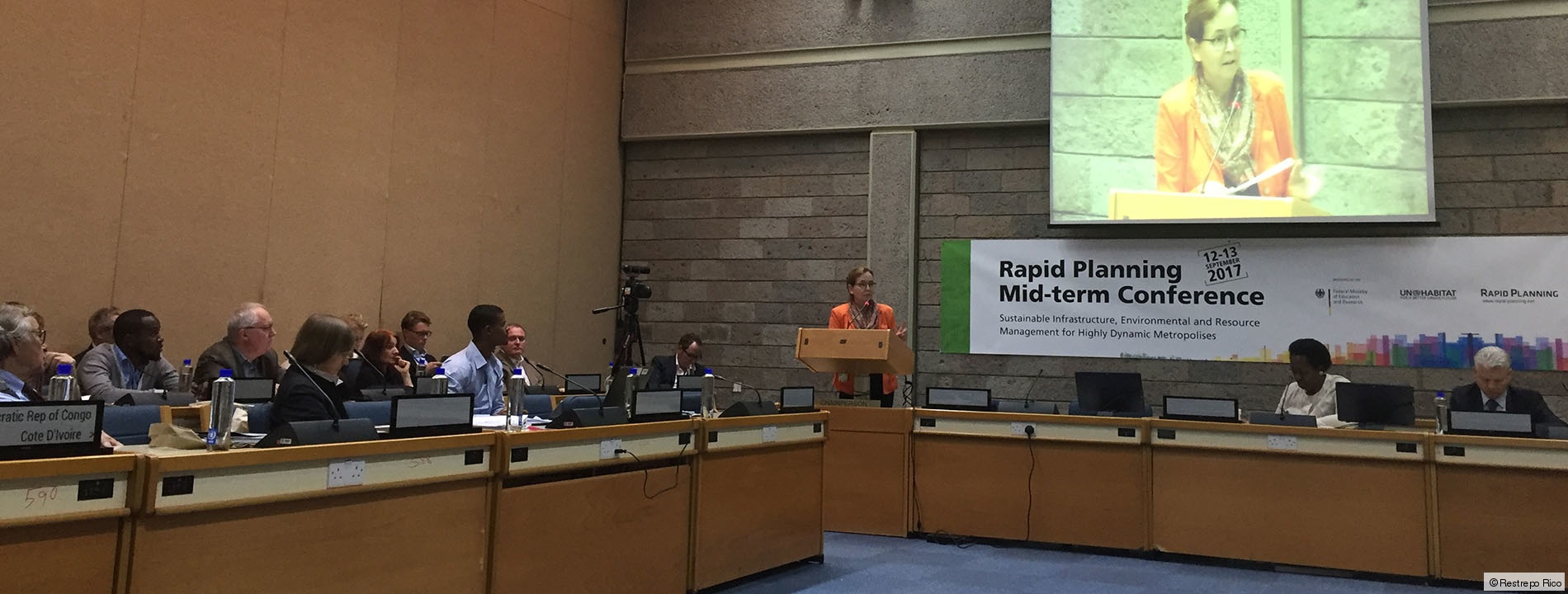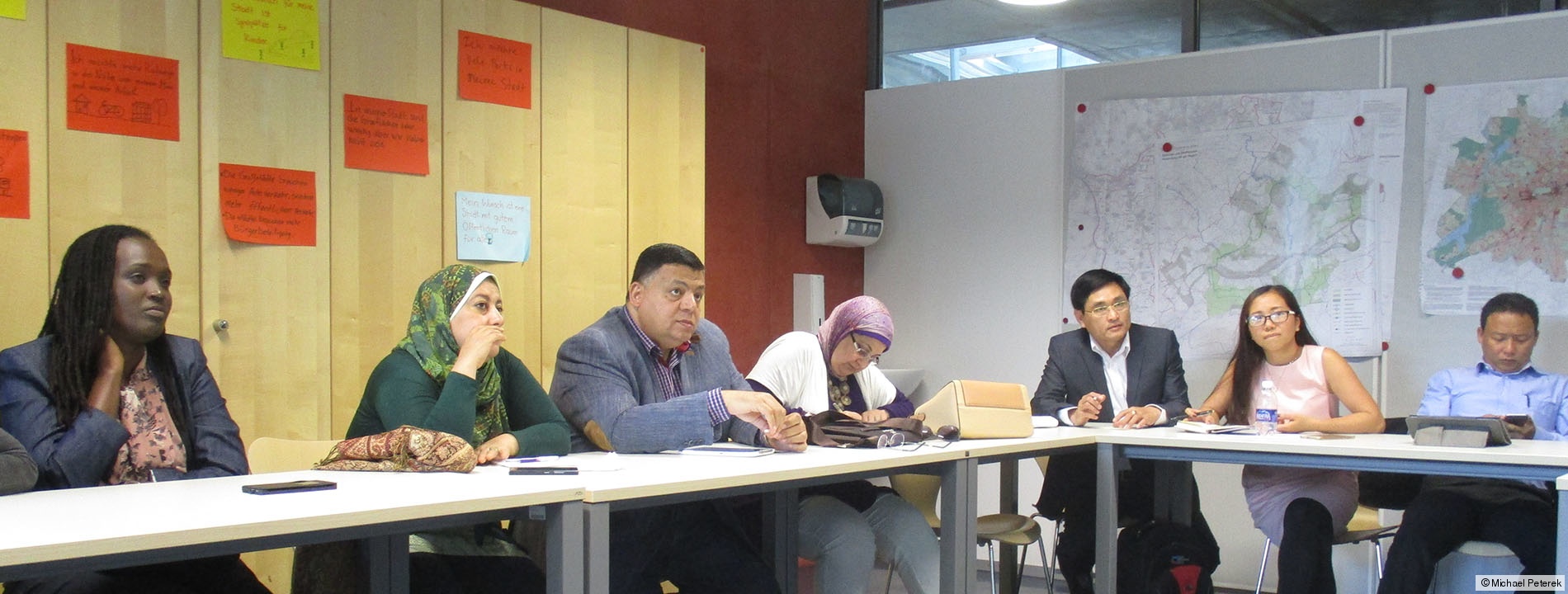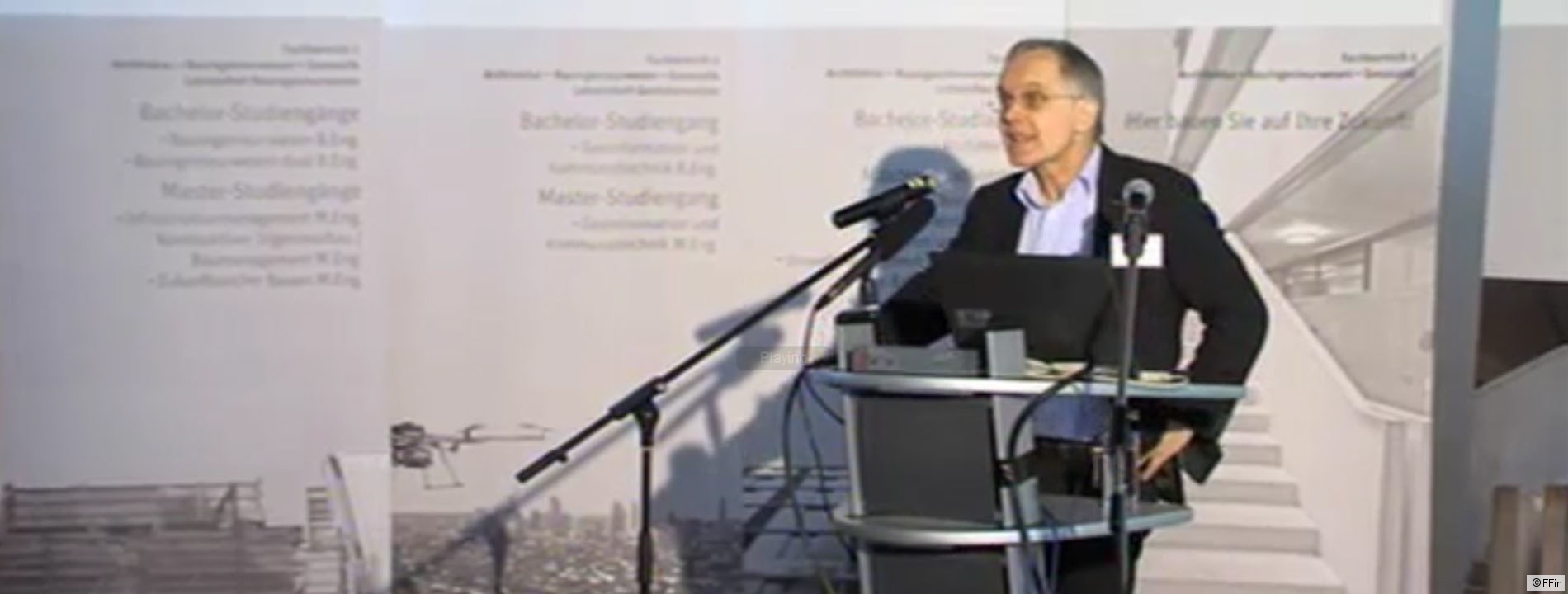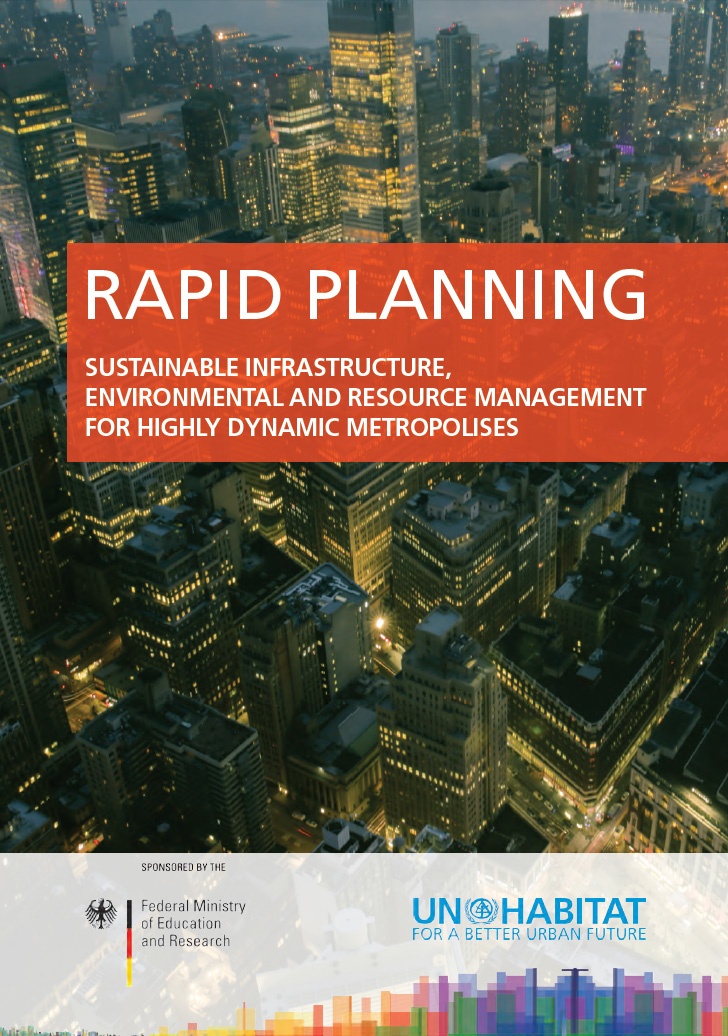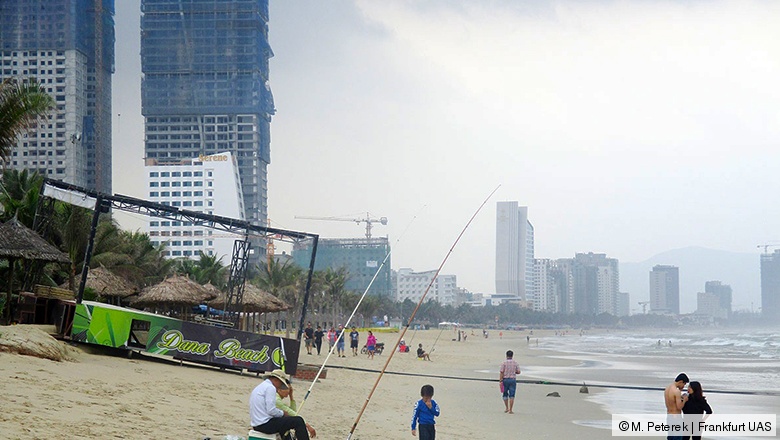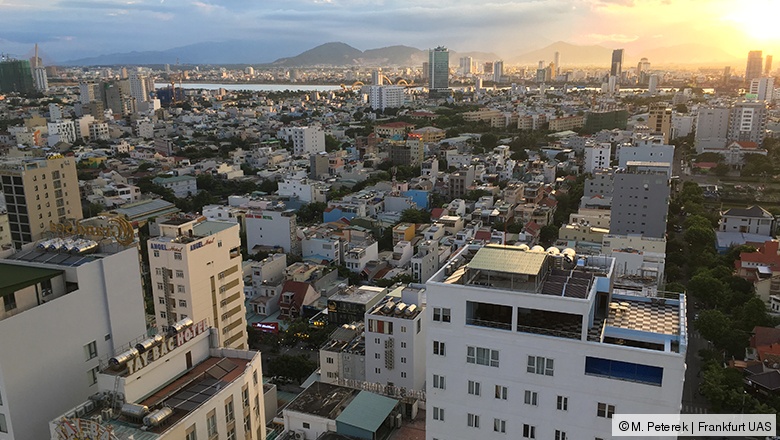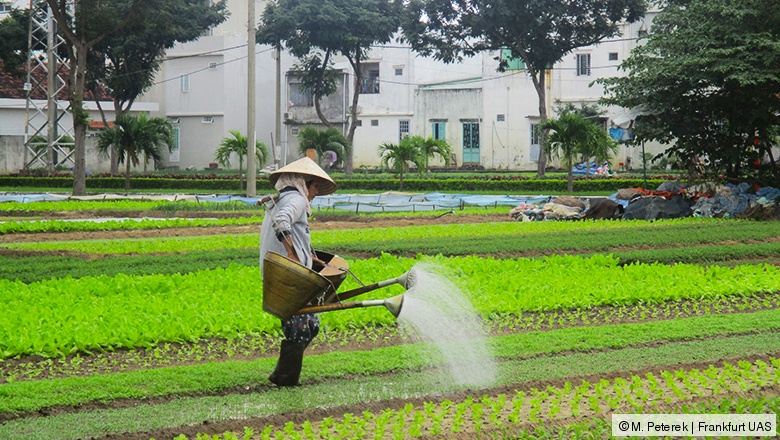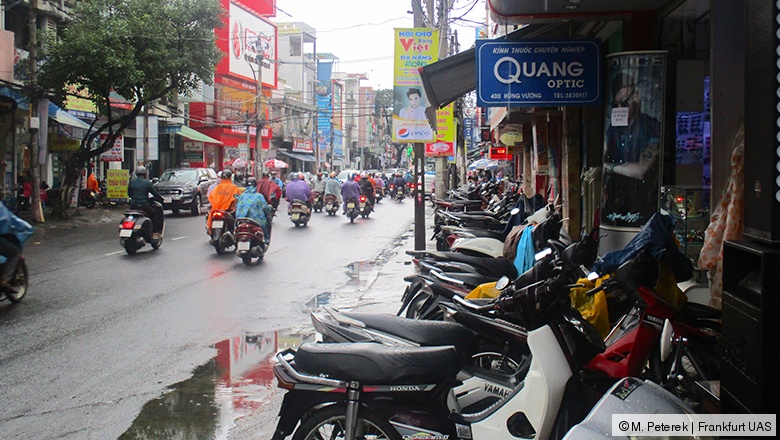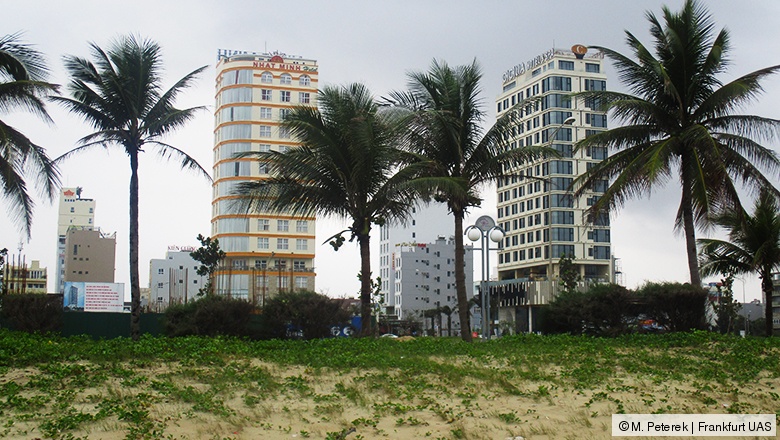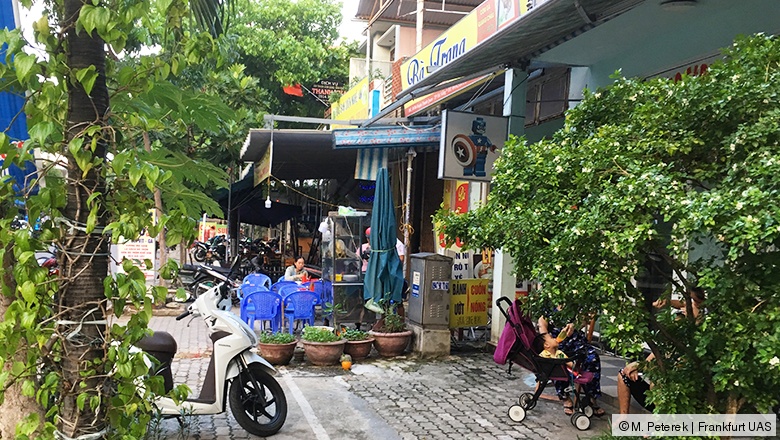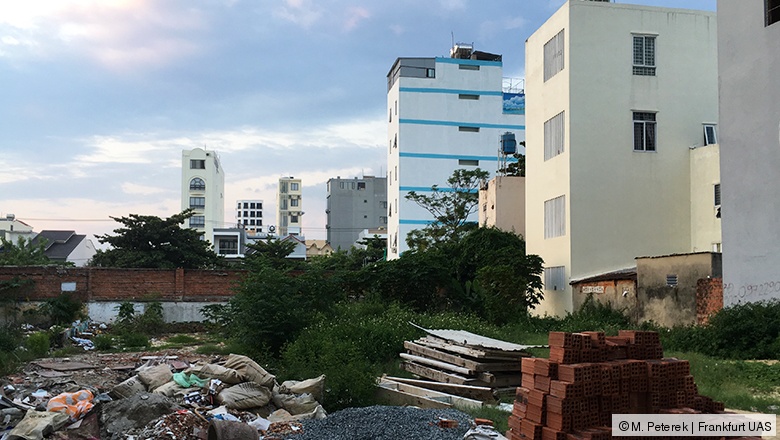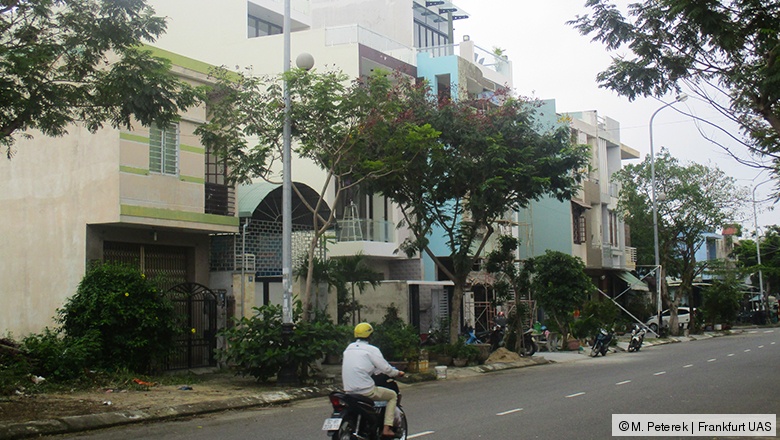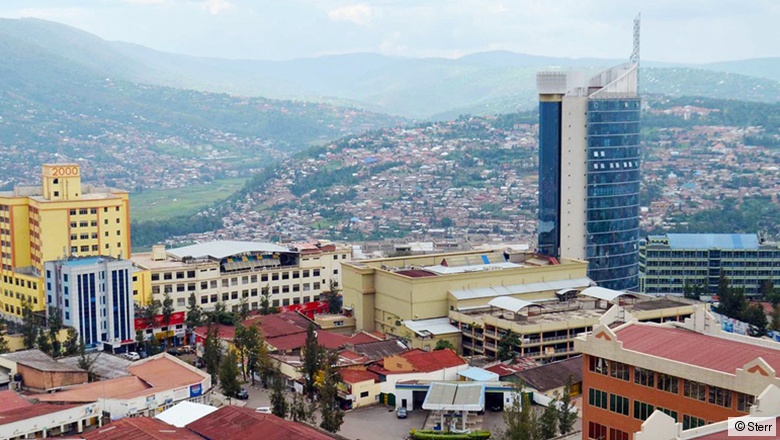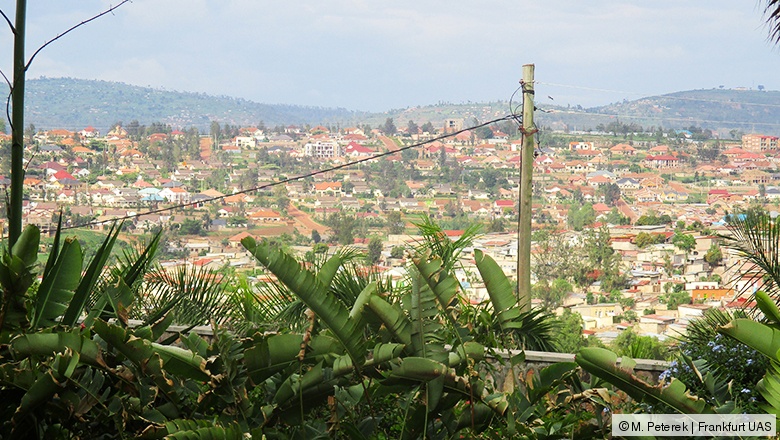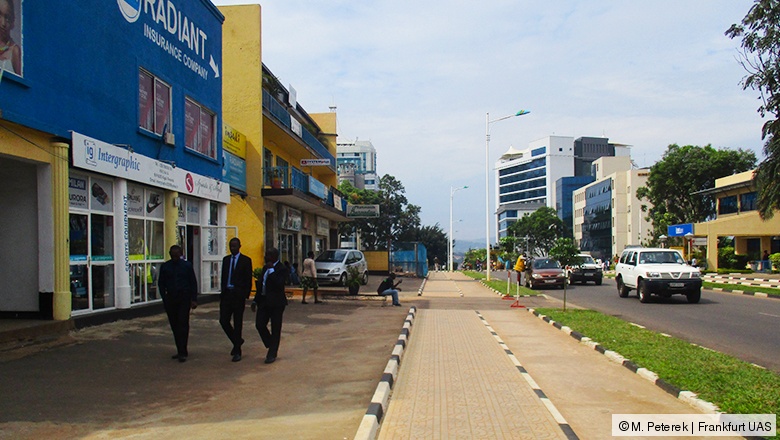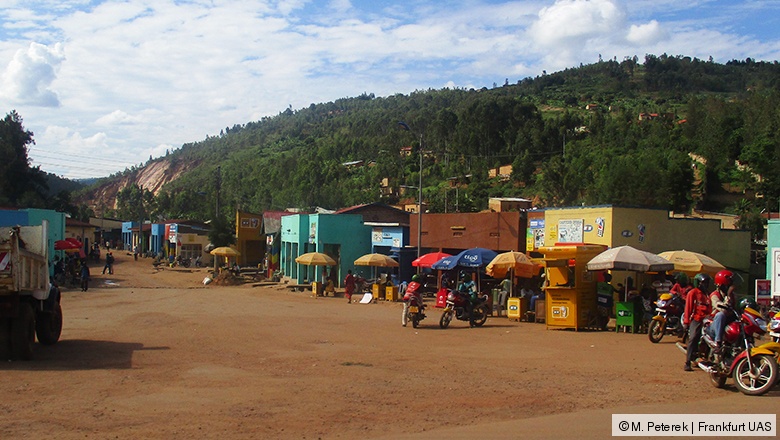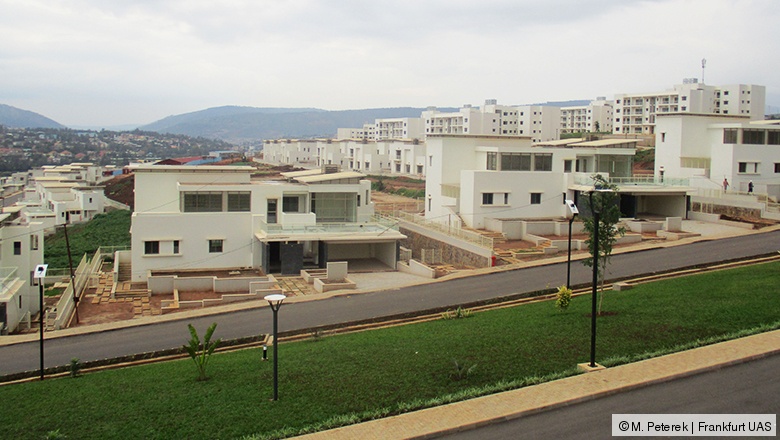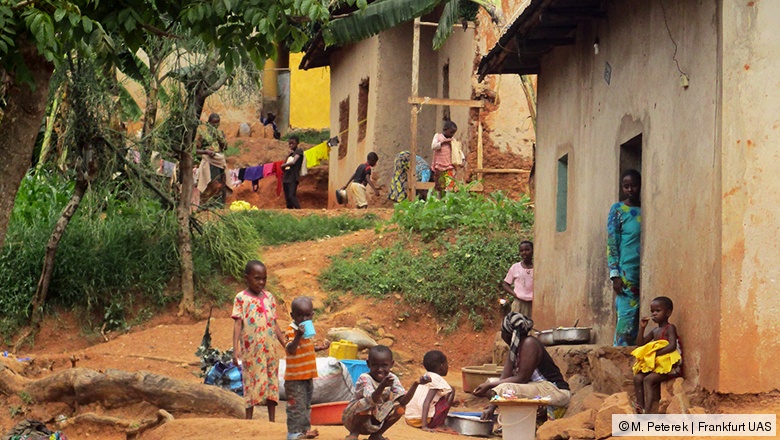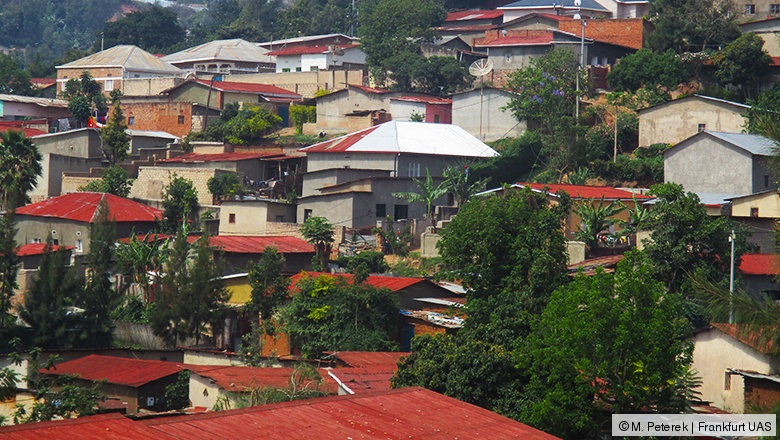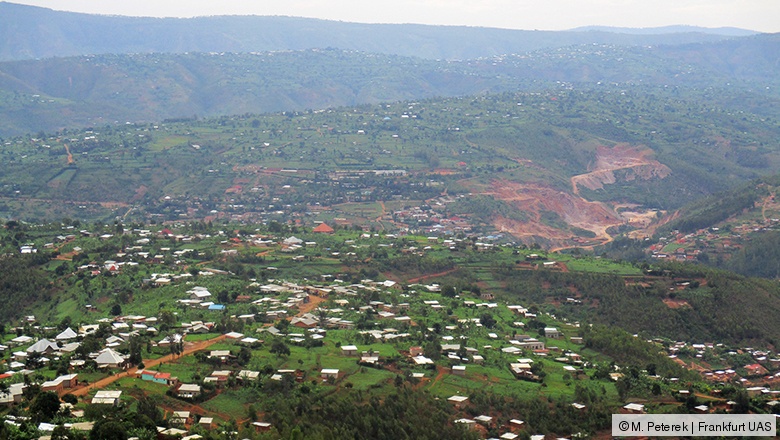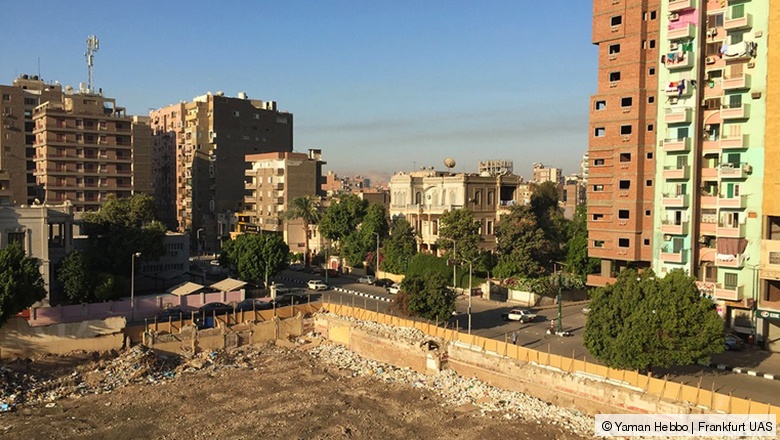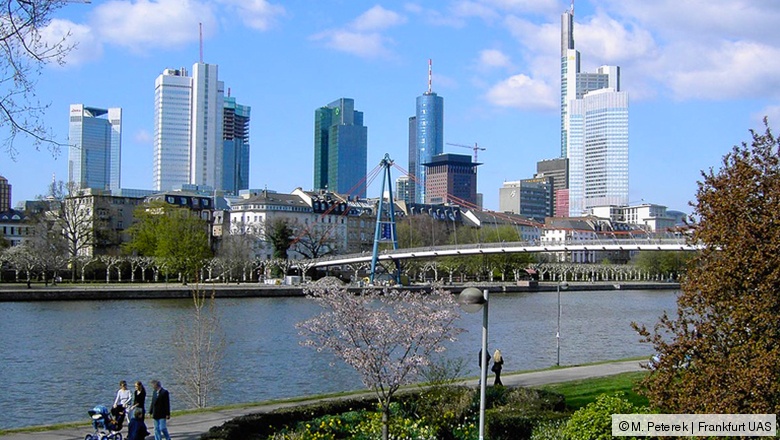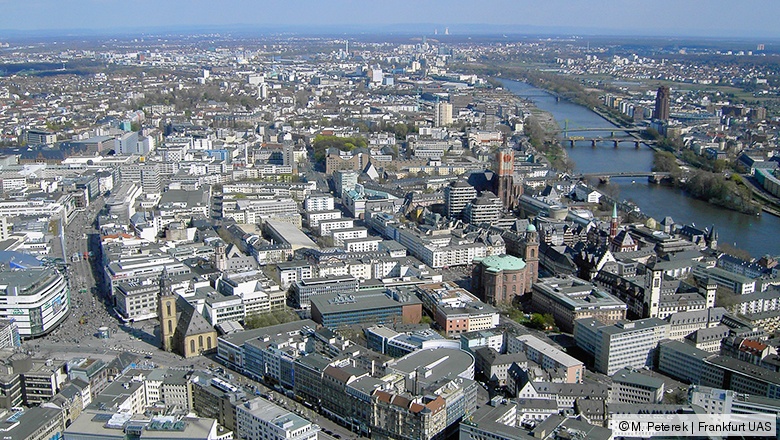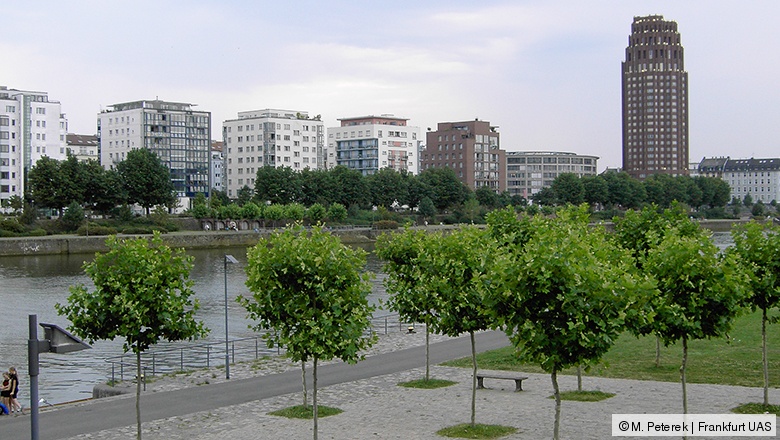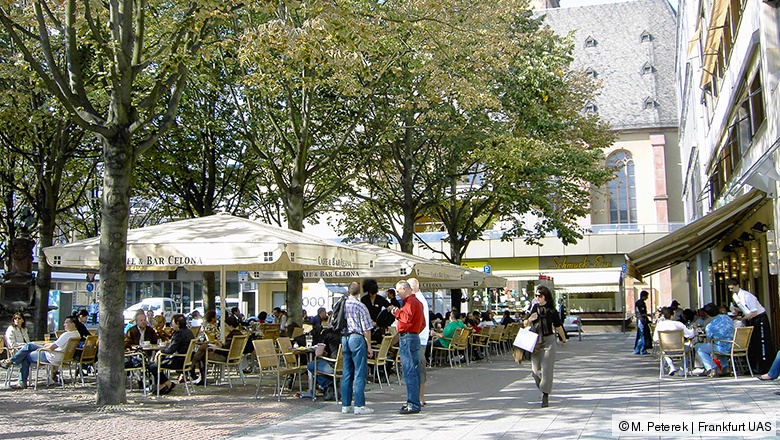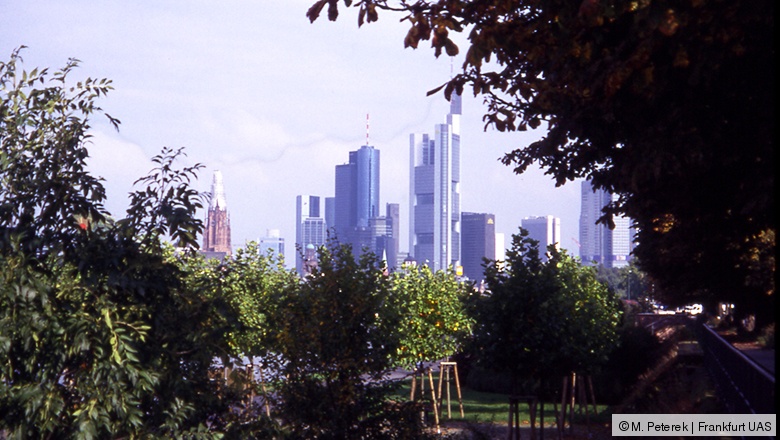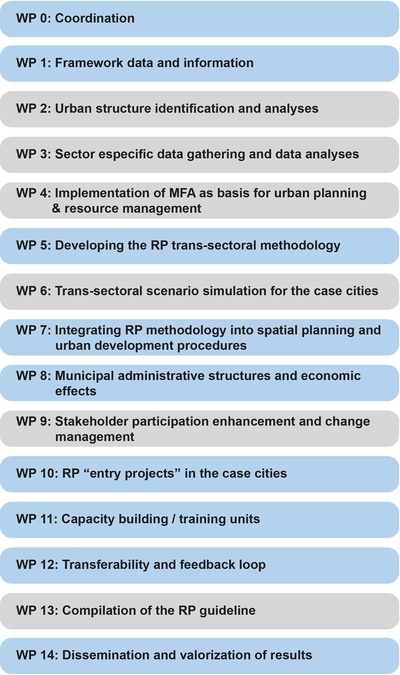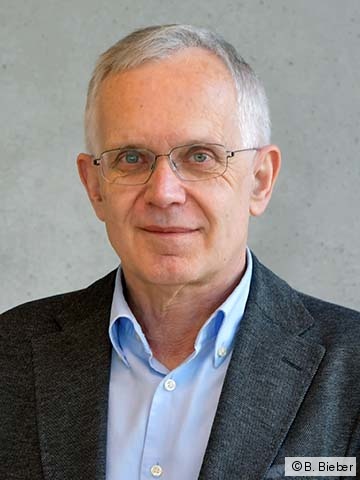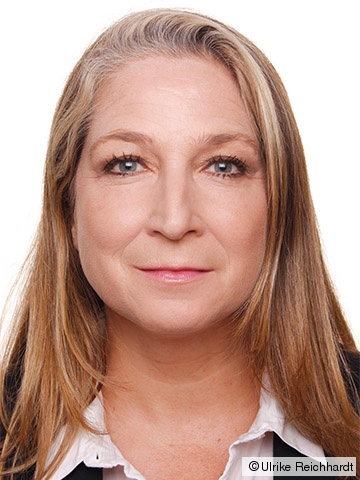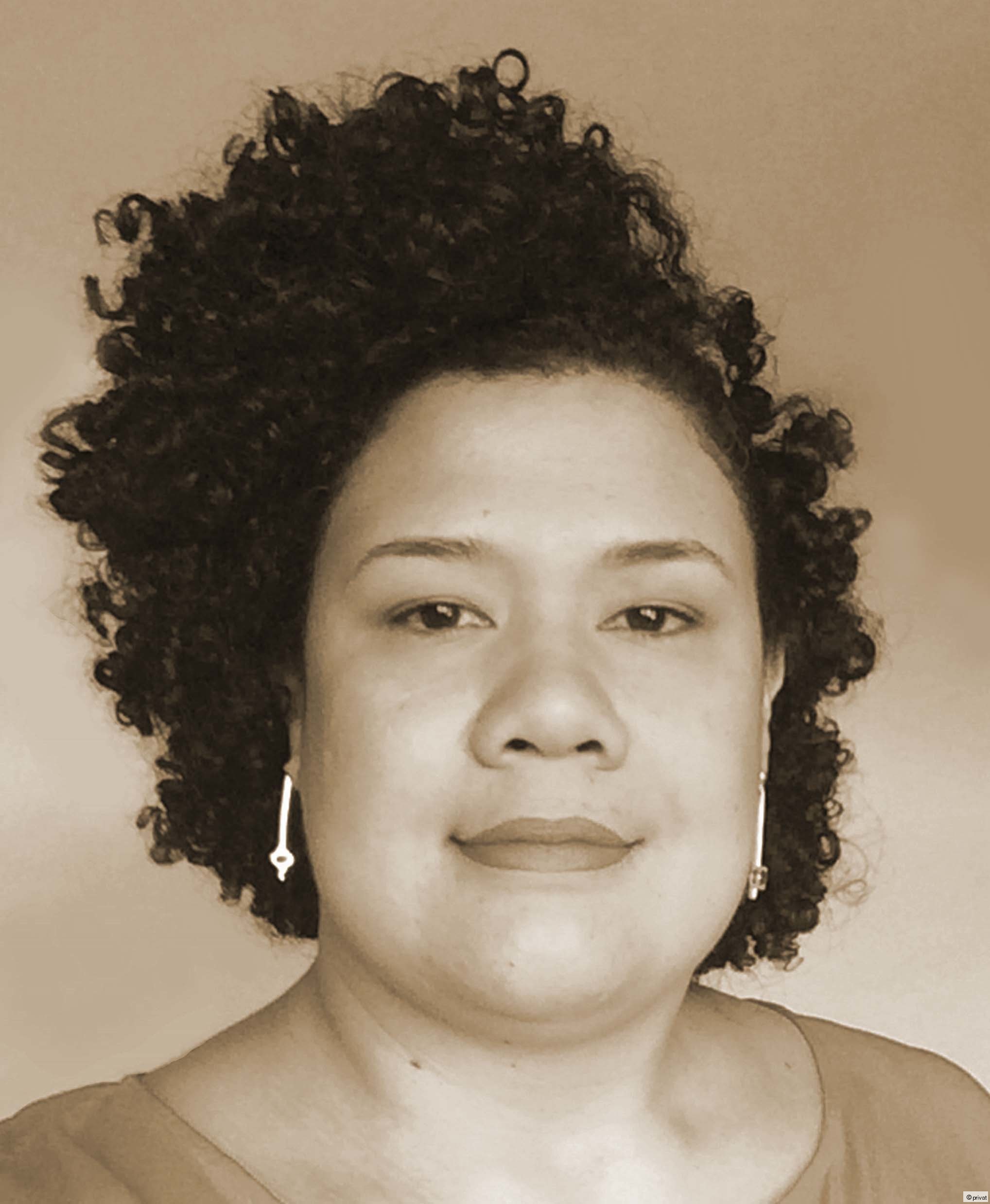Rapid Planning
Rapid Planning (RP) is an action oriented research project that has been developed under the umbrella of the Future Megacities Research Program of the German Federal Ministry for Education and Research (BMBF) from 2014 to 2020. RP seeks to develop a rapid trans-sectoral urban planning methodology with a focus on urban basic services infrastructure, specifically targeting supply and disposal infrastructure. The service sectors covered by the project include energy, water, waste water, solid waste, and urban agriculture.
Frankfurt UAS is responsible for the RP subproject 3 “Urban Planning and Capacity Building”.
Frankfurt University of Applied Sciences (Frankfurt UAS) has been extensively involved in the integration of the project with the German reference city of Frankfurt am Main, as well as in the integration of the RP methodology into spatial and urban planning procedures in the case cities. It has also been involved in the analyses of the different municipal administrative and planning structures and has been the leader of “Capacity building/training units” work package, including the organization of capacity building workshops for the international partners.
Rapid Planning has been sponsored by the German Federal Ministry for Education and Research (BMBF).
Events and activities
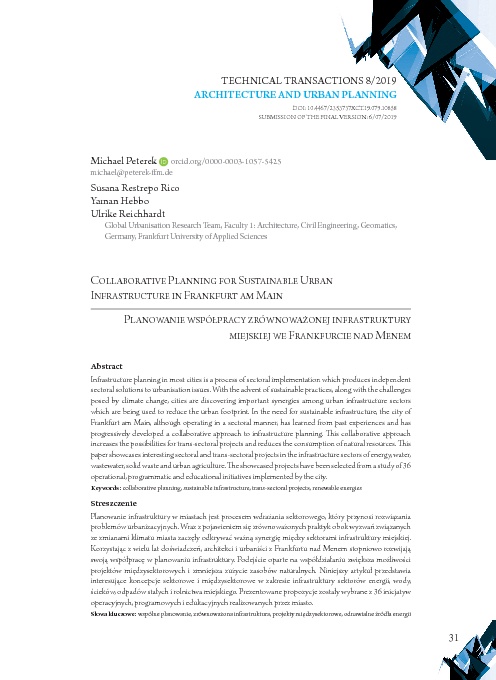
RAPID PLANNING, Collaborative planning for sustainable urban infrastructure in Frankfurt am Main
A publication of the Frankfurt UAS Rapid Planning Team for the scientific journal 'Technical Transactions', 8-2019, pag. 31-50
Link to download the complete article here
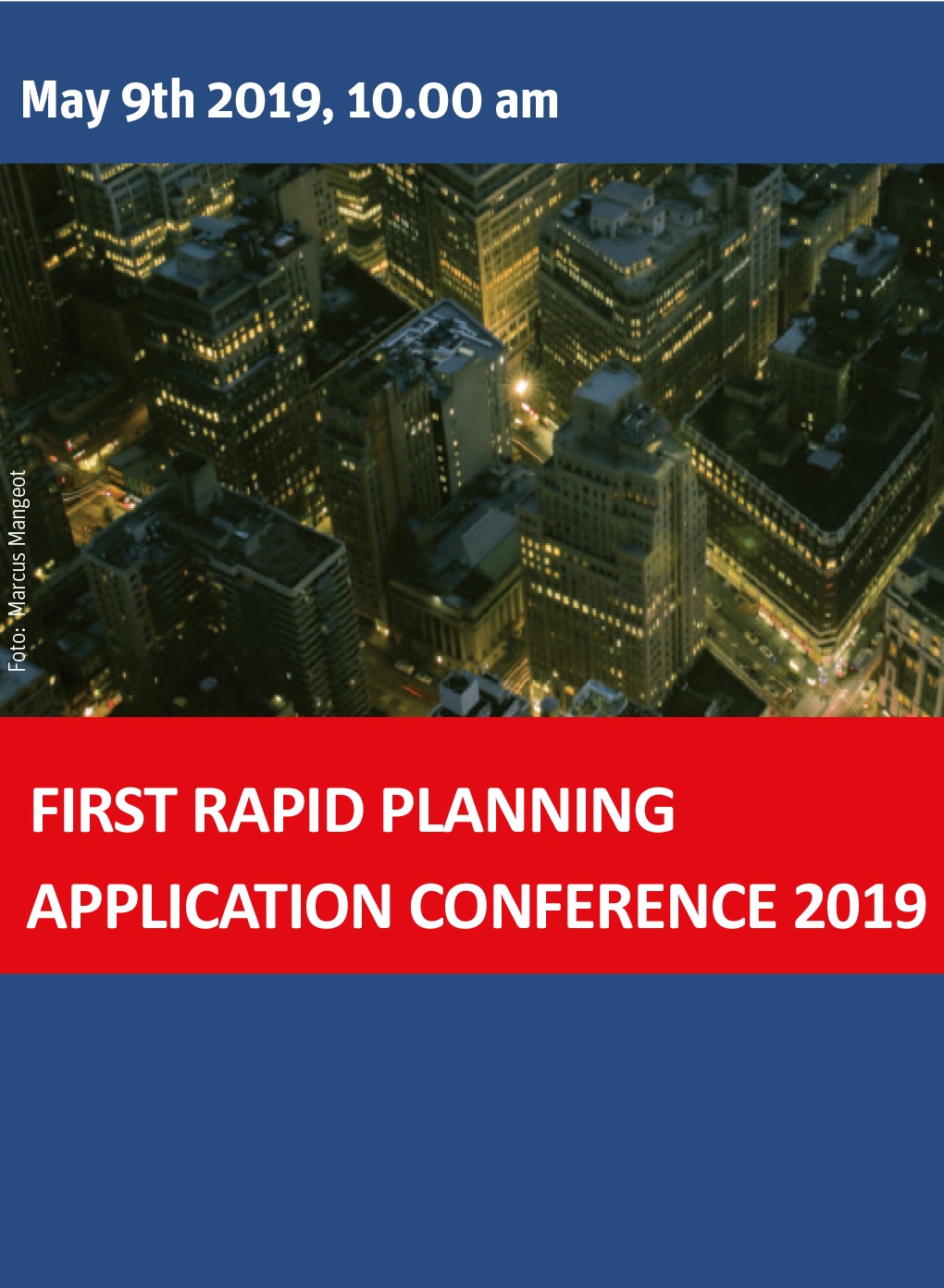
RAPID PLANNING, First Application Conference
On May 9, 2019, the First Rapid Planning Application Conference will take place at the venue of the City Planning Department in Frankfurt am Main.
Download of the conference program here
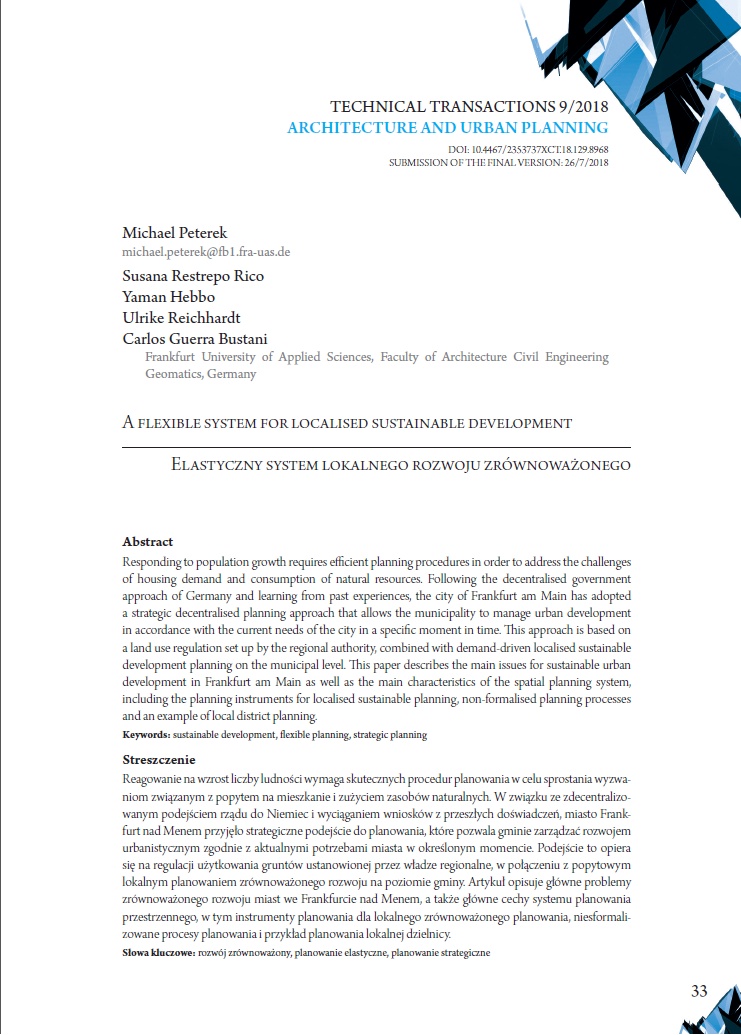
RAPID PLANNING, A flexible system for localized sustainable development
A publication of the Frankfurt UAS Rapid Planning Team for the scientific journal 'Technical Transactions', 9-2018, pag. 33-48.
Link to download the complete article here.
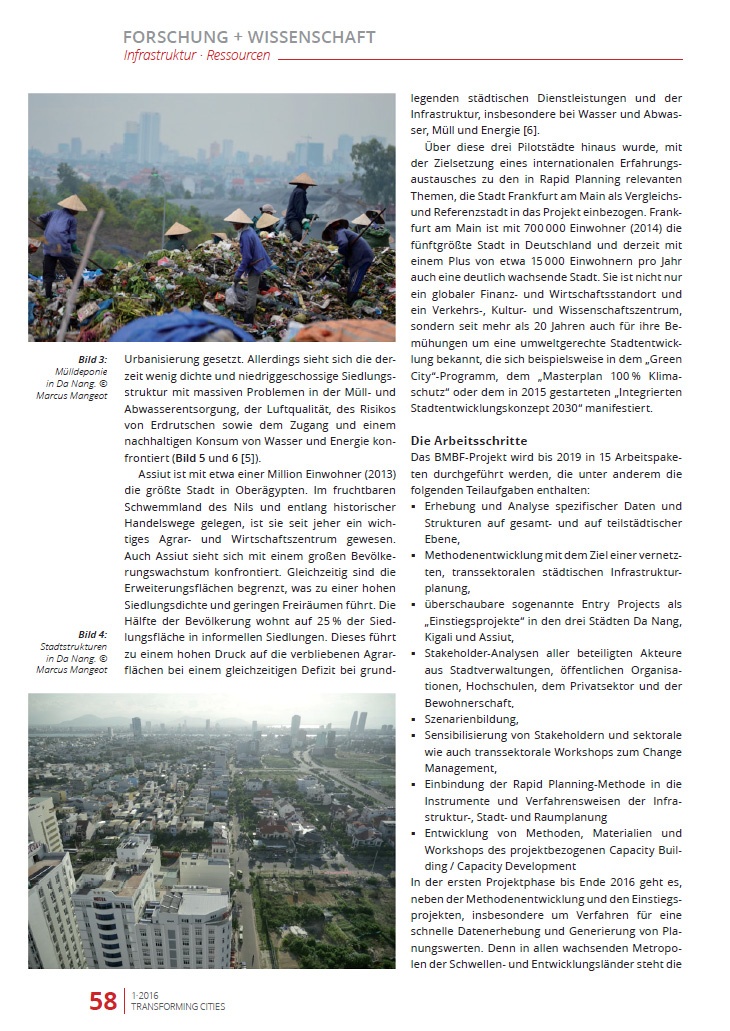
RAPID PLANNING, Nachhaltiges Infrastruktur-, Umwelt- und Ressourcen- Management für hoch dynamische Metropolregionen
A publication of the Frankfurt UAS Rapid Planning Team for the journal TRANSFORMING CITIES, 1-2016, pag. 56-60.
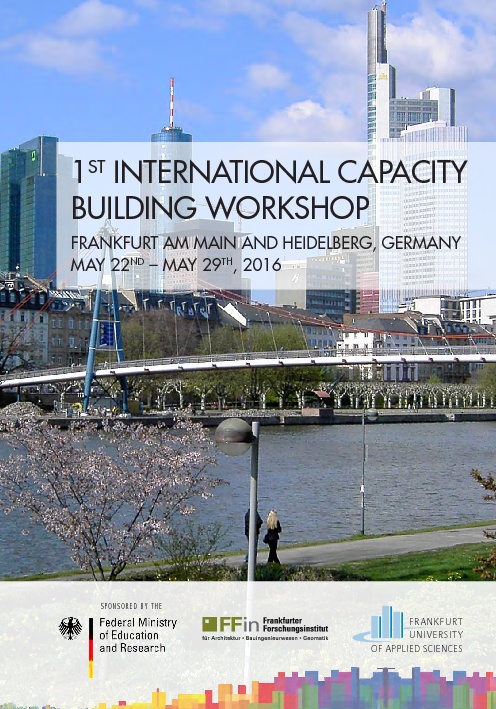
RAPID PLANNING, 1ST INTERNATIONAL CAPACITY BUILDING WORKSHOP
International Conference in Frankfurt am Main and Heidelberg, Germany, May 22nd – May 29th, 2016
RAPID PLANNING, Sustainable Infrastructure, Environmental and Resource Management for Highly Dynamic Metropolises
Brochure by the Rapid Planning Consortium, 2015
The brochure can be downloaded here.
Press articles on Rapid Planning have been published by Frankfurter Rundschau on September 23rd, 2014, and on May 14th, 2016.
Partners and funding

This project is funded by the German Federal Ministry for Education and Research (BMBF).
Project background
Nowadays, urban sustainability is threatened by global changes and challenges that comport among others:
- Economic changes
- Rapid technological and social changes
- Scarcity of resources
- Impact of environmental and climate changes
Therefore, mayors, municipal authorities and city planners throughout the world are confronted with a number of pressing issues, among which comes as a most important and urgent question:
How can cities improve their quality of life and competitiveness as well as protect the environment and conserve resources at the same time?
Overview
The Rapid Planning Project (RP) comes as a measure of creativity and originality going in such direction. RP is an action oriented scientific project that addresses the actual and foreseeable upcoming issues of dynamic city development and their related challenges. It aims at developing urban sustainability solutions that marry successfully with local implementation contexts.
Focus Fields
Rapid Planning seeks to develop a rapid trans-sectoral urban planning methodology with a focus on urban basic services infrastructure, specifically targeting supply and disposal infrastructure, which include:
- Energy
- Water
- Waste water
- Solid waste
- Urban agriculture
Work packages
The goals of Rapid Planning – Sustainable Infrastructure, Environmental and Resource Management for Highly Dynamic Metropolises, have to be achieved within a time frame of six years (2014-2020) by means of a logical framework featuring 15 work packages including coordination.
The tasks performed by Frankfurt University of Applied Sciences (Frankfurt UAS) are closely coordinated with those of the other 11 project partners.
Case cities
The research work is based on the practical experiences in Africa and Asia, and Frankfurt as a reference city in Germany:
Da Nang, Vietnam
Kigali, Rwanda
Assiut, Egypt
Population: 979,892 inhabitants
Extension: 256 km²
Frankfurt, Germany
Goals
Besides the overall objectives of the project, Frankfurt University of Applied Sciences aims to achieve the following set of targets:
Exploitation and integration of experiences of the German reference city Frankfurt am Main
Exchange of knowledge and know-how between the German and the international cities
Integration of the RP planning methodology into overall spatial and urban planning practice
Adaptation of RP approach to municipal administration structures and procedures
Capacity building and knowledge transfer methods and materials
Development of workshops/ training units for administrations, the public and academia
Transferability, dissemination and valorization of results, knowledge and methodologies
Tasks
Frankfurt University of Applied Sciences takes part in the following work packages of the project:
Coordination
Framework data and information
Developing the RP trans-sectoral methodology
Integrating RP methodology into spatial planning and urban development procedures
Municipal administrative structures and economic effects
RP "entry projects" in the case cities
Capacity building/ training units
Transferability and feedback loop
Dissemination and valorization of results
Results
Five results are to be met by Rapid Planning in five years:
Realizing a trans-sectoral planning tool (strategy, methodology and practice) in the case cities with a maximum level of readiness for application in other cities
Initiating a shift in the structure of urban authority, management and administration as well as in the way of thinking and decision-making – all to be done with special regard to trans-sectoral resource efficient planning
Establishing a thorough capacity building for administrations, academia, public and exchange activities in the targeted cities to better integrate the trans-sectoral approach
Installing a feedback loop and constant checking of transferability
Providing verified data bases for the methodology development, which include:
Physical (climate, morphological, etc.), human (political, socio-economic, population, etc.) and geographic data
Information on supply and disposal infrastructure
Information characterizing legislation and policy framework of the case-cities
Results and deliverables by Frankfurt UAS
Frankfurt UAS has been the responsible local project partner (“Focal Point”) for the integration and relation with the German reference city Frankfurt am Main. Frankfurt UAS has been involved in the integration of the RP methodology into spatial and urban planning procedures in the case cities, in the analyses of the different municipal administrative and planning structures, and has been the leader of “capacity building/training units” work package, including the organization of capacity development workshop for the international partners in Germany and in Vietnam. Additionally, it has had its share in the dissemination and valorization of the results.
Results for work package 7
In this work package for integrating the Rapid Planning methodology into spatial planning and urban planning procedures, the following documents are available:
Deliverable – D 7
Review of the Urban Development in Frankfurt am Main and the Lessons Learned for Trans-sectoral Planning
This document revolves around five major topics. The first discusses the spatial planning system, procedures, and instruments utilized by the planning authority in the city of Frankfurt am Main. Therefore, a description of the institutional structure as well as of the development plans, measures and by-laws of the city becomes necessary in order to understand the formal framework steering urban development of the city. The second handles the city dynamics, urban development trends along with the goals and vision of the city. The goal is to understand the drivers as well as the challenges of city planning and infrastructure development. The third discusses the tensions between urban development and city planning in Frankfurt identifying the gaps between the planning procedures and the future vision. Based on the established understanding, the fourth summarizes the lessons learned from the research experiences and activities in the city. And, the last proposes a set of recommendations.
The complete document can be found here.
Deliverable – D 7.1/7.2
Documentation and Review of Spatial Planning Systems and Urban Development Goals in Assiut, Egypt
This document discusses the topic of urban development and city planning of Assiut in its general terms. This includes the presentation of the administrative system of spatial planning, the city’s dynamics, trends, tensions as well as urban development goals and visions of the future development.
The complete document can be found here.
Scientific Article
Michael Peterek, Susana Restrepo Rico, Yaman Hebbo, Ulrike Reichhardt, Carlos Guerra Bustani (2018)
A Flexible System for Localised Sustainable Development
In: Technical Transactions, Vol. 9/2018, Kraków: Cracow University of Technology Press, pp. 33–48
The complete document can be found here.
Results for work package 10
In this work package for analyzing the projects and practices of sustainable infrastructure planning in Frankfurt am Main , the following document is available:
Deliverable – D.10
Experiences in Infrastructure Development in the Reference City Frankfurt am Main
This document examines Frankfurt am Main, Germany, as a reference city for studying the planning and implementation processes of urban infrastructure development focused on sustainability and maintaining good quality of life. The first section of the document describes the diverse projects being implemented in the sectors of energy, water, wastewater, solid waste and urban agriculture. These projects serve as examples of environmentally-friendly urban development, as well as inter-departmental collaboration and continuity in the development of a sustainable city. This section also highlights the collaborative approach to urban infrastructure planning and management in Frankfurt. The second section of the document compiles the lessons learned from the previous analysis.
The complete document can be found here.
Scientific Article
Michael Peterek, Susana Restrepo Rico, Yaman Hebbo, Ulrike Reichhardt (2019)
Collaborative Planning for Sustainable Urban Infrastructure in Frankfurt am Main
In: Technical Transactions, Vol. 8/2019, Kraków: Cracow University of Technology Press, pp. 31–50
The complete document can be found here.
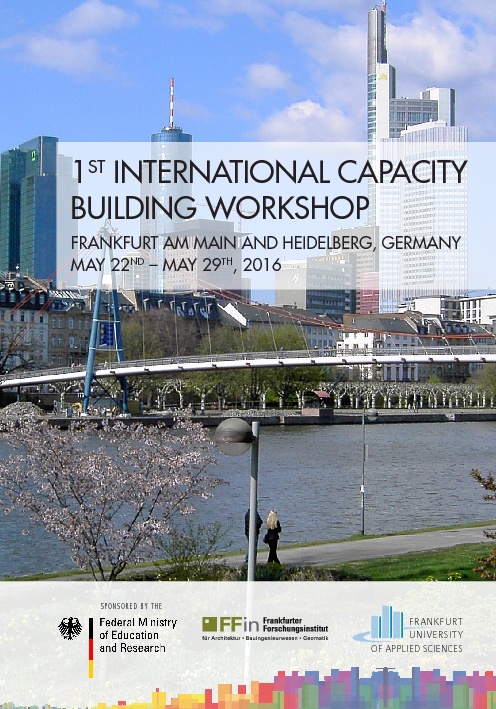
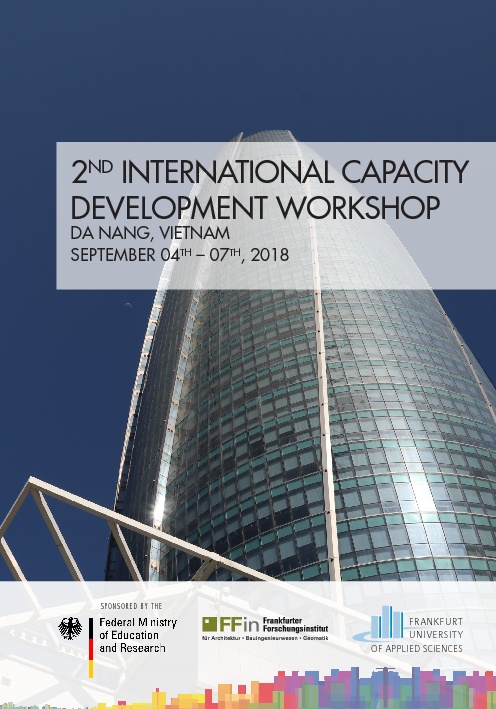
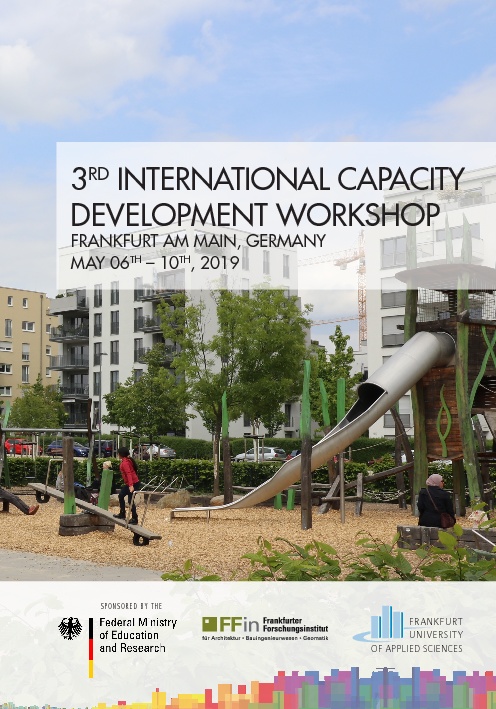
Results for work package 11
In this work package targeting capacity development within Rapid Planning, the following documents and documentation brochures of in total three international capacity development workshop (2016 in Frankfurt and Heidelberg, 2018 in Da Nang, and 2019 again in Frankfurt) are available:
Deliverable – D 11.1
An Outline for a Capacity Building File for Urban Planning Administrations. The General Component
This document presents a capacity development process for the Rapid Planning project based on the theory of strategic planning and specific concepts of capacity building and capacity development. The document is aimed at municipalities, specifically public administration institutions and planning officials. Experiences and best examples in capacity development around the worlds are also outlined at the end of the document.
The complete document can be found here.
Deliverable – D 11.14b
1st International Capacity Building Workshop in Frankfurt am Main and Heidelberg, 2016
The complete document can be found here.
Deliverable – D 11.14c
2nd International Capacity Development Workshop in Da Nang, 2018
The complete document can be found here.
Deliverable – D 11.14d
3rd International Capacity Building Workshop in Frankfurt am Main, 2019
The complete document can be found here.
Final Report
The final report of Frankfurt University of Applied Sciences from November, 2020 (in German) can be found here.
Team
- Architect and Urban Planner
- Professor of Urban Design
- Course Director of International Master Programme “Urban Agglomerations” (M.Sc.)
- Research and Innovation Manager at FFin Institute and Faculty 1
- Project coordination and management
- Lecturer in research methodologies
- Architect and Urban Planner
- Architect and Urban Planner
- Eng. Deborah Machado Ayres
- M.Sc. Elvia Erosa Mercado
- M.Sc. Olga Korovina
- M.Sc. Monica Salazar Duenas
- M.Sc. Carlos Guerra Bustani
- M.Sc. Natalia Calixto Solano
Rapid Planning Project Office
Visitors address:
Frankfurt University of Applied Sciences
Nibelungenplatz 1
Building Kleiststr. 1, Room E 81
D-60318 Frankfurt am Main
Tel. +49 69 1533-3617
Tel. +49 69 1533-3694


